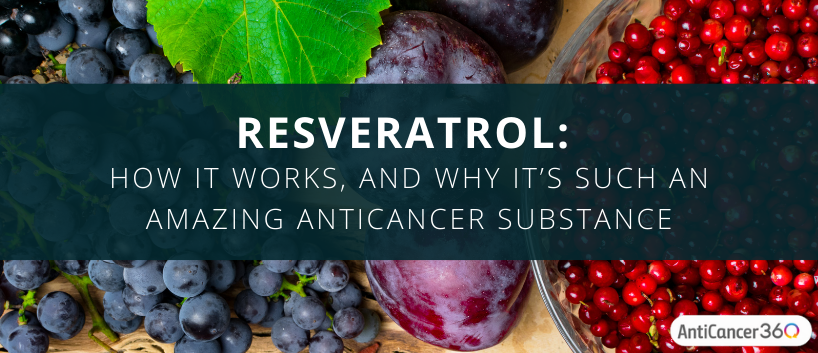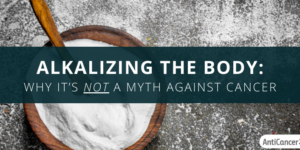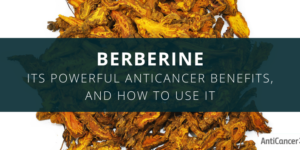When you are fighting late-stage and challenging cancer, it is essential to support your body in every way possible. Resveratrol is a natural substance that is widely recognized for its health benefits. Depending on your situation, resveratrol may be an important element to help you fight cancer from every angle, in addition to your oncologist treatments.
There is a wealth of scientific evidence supporting resveratrol’s health benefits, a component of red wine, including how resveratrol can prevent and fight cancer.
In today’s blog post, we will show you how resveratrol works to fight cancer. We’ll also explore how to starve cancer cells with resveratrol, without harming healthy cells… and, depending on your situation, how it can be a powerful weapon in your personal fight against cancer.
What Is Resveratrol?
Resveratrol is an antioxidant substance produced by plants primarily found in red wine, red grape skins, and grape seeds. If you enjoy an occasional glass of wine, consider trying Pinot noir. The pinot noir grape consistently has the highest resveratrol content, regardless of climate, averaging 5.13 mg resveratrol per liter [1].
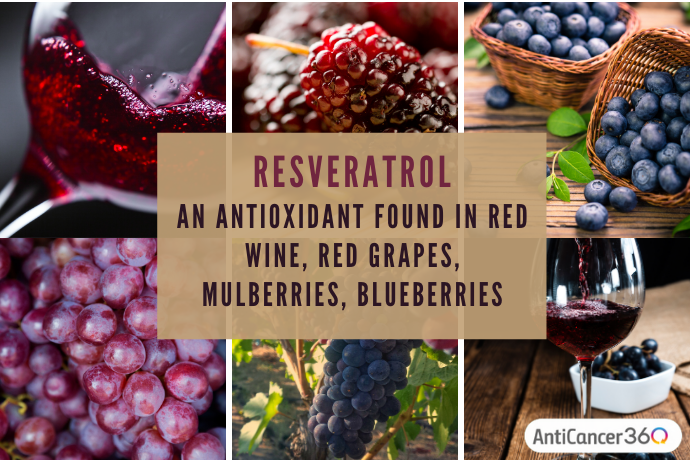
Other resveratrol sources include mulberries, blueberries, Hu Zhang root, eucalyptus, spruce, and to a small extent, peanuts.
Resveratrol is a phytoalexin, which functions as a plant protectant. Interestingly, resveratrol is produced by some plants as a defense mechanism when the plant faces stress such as disease or trauma [2].

Next, we will take a closer look, at the molecular level, at how resveratrol is thought to carry that defense mechanism action into the human body… and have anticancer effects.
Cancer Metabolism Suppression: How to Starve Cancer with Resveratrol
Cancer metabolism is the process by which cancer feeds itself with nutrients and makes energy for its growth and survival. So the use of certain drugs and natural supplements to starve cancer cells is a critical strategy when you’re fighting cancer in every direction.
So we want to prevent sugar, fats, and proteins from nourishing cancer cells. This strategy weakens cancer cells, which makes them more vulnerable to treatments. And, resveratrol is one of many natural substances that can be strategically used to starve cancer. Now, let’s check out the scientific evidence behind this and how it can help you.
Resveratrol May Block Cancer Metabolism of Glucose
Cancer cells have different metabolic needs than that of nearby healthy tissues. Most cancer cells have an altered metabolism that allows them to break down sugar (glucose) to make energy, even when resources like oxygen are limited.
So, tumor cells typically require lots of sugar to fuel their high-demand energy needs. Sugar (glucose) is the primary source of energy for many types of cancers.
GLUT1 is a protein that transports glucose from the bloodstream into cells. GLUT1 is the principal transporter of glucose. In many forms of cancer, tumor cells tend to grow more GLUT1 transporters on their surface than normal cells. This is known as the “upregulation” of GLUT1. So, GLUT1 makes an excellent target when researching and developing cancer treatments [3].
Resveratrol may naturally inhibit (block) GLUT1 in some cancer cells. By blocking the transport of glucose into cancer cells, resveratrol helps to deplete their energy.
In addition to blocking GLUT1, resveratrol also seems to decrease the total number of GLUT1s. This may be due to resveratrol interrupting the cancer cells’ process of converting its genetic blueprints (mRNA) into functional proteins like GLUT1. So in this sense, resveratrol may reduce some cancer cells’ ability to upregulate GLUT1 [3].
It is interesting to observe that resveratrol seems to block the transport of glucose from the blood into cancer cells. But in non-cancer cells, resveratrol appears to increase glucose uptake and improve insulin sensitivity. So depending on the type of cell, resveratrol seems to exhibit anticancer or antidiabetic activity [3].
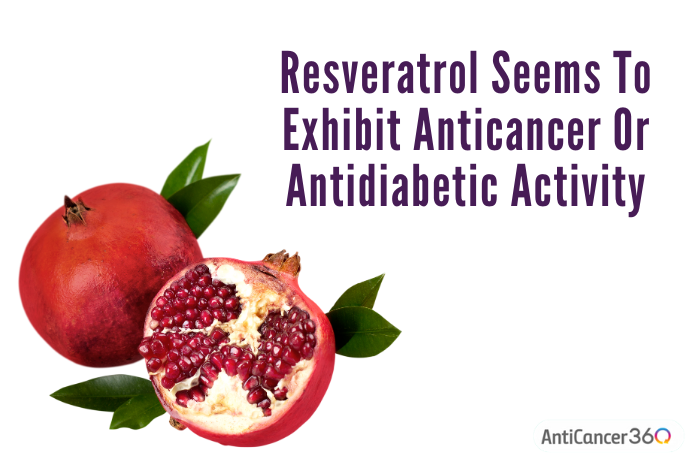
Resveratrol may also interrupt glycolysis and oxidative phosphorylation, both of which are energy-generating processes that cancers use to survive. Glycolysis and oxidative phosphorylation (OxPHOS) are both processes that convert glucose into energy. Glycolysis requires low oxygen levels to produce energy, whereas OxPHOS requires higher oxygen levels.
In a recent study, researchers treated colon cancer cells with low doses of resveratrol to explore how resveratrol impacts cancer glucose metabolism. They found that resveratrol decreased the activity of the pentose phosphate pathway (PPP) by 36% [3].
The PPP is a process that starts with a form of sugar (glucose-6 phosphate) and, through a chain reaction, leads to the formation of several critical products. Without the PPP, the cancer cell cannot produce lipids to assemble its cell membrane. Without the PPP, the cancer cell fails to produce glutathione, which acts as the cell’s antioxidant defender against reactive oxygen species (ROS).
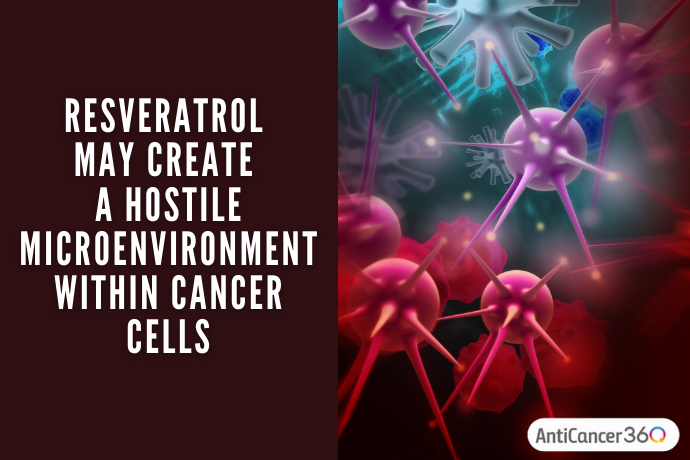
In another study of resveratrol’s effects on cancer cells, it was observed that, within 2 days, the resveratrol-treated cells had significantly decreased levels of both glycolysis and OxPHOS compared to non-treated cells. Also, in this study, resveratrol-treated cancer cells had excessive cellular ROS, 2 to 3 times the levels of non-treated cells.
Therefore resveratrol may help to create a more hostile environment within some cancer cells, further weakening them [4].
Resveratrol Can Interrupt Cancer Metabolism of Glutamine
Unfortunately, cancer cells are good at continually adapting. If a tumor is starved of sugar, it can redirect its energy production from other nutrients like protein and fat.
Amino acids are the building blocks of proteins, and glutamine is the most abundant amino acid in our bodies. Proteins have numerous essential cell functions. Tumor cell proliferation demands a high level of glutamine metabolism. Finding ways to interfere with cancer cell metabolism of glutamine is a central goal of anticancer research… and resveratrol can help with this.
Resveratrol has been found to influence a glutamine-related pathway called “mTOR” (the mammalian target of rapamycin.)
mTOR is an enzyme (protein kinase) that is recognized as the principal regulator of animal growth and is a crucial link between the availability of nutrients in the environment and metabolic control. Scientists have learned that the mTOR pathway becomes hyperactive during various cell processes like tumor formation and insulin resistance, and becomes uncontrolled in cancer and type 2 diabetes [5].
Scientific research shows that resveratrol acts as an anticancer agent by blocking mTOR signaling. Numerous studies have suggested that blocking mTOR signals may provide a key mechanism underlying resveratrol’s cancer-fighting action over the past decade [6].
Resveratrol also plays a role in blocking the transport of glutamine (the most abundant amino acid) into cancer cells. This may contribute to findings that resveratrol can enhance the effects of chemotherapy.
Glutaminolysis is the cell process that breaks down glutamine into cellular energy, known as ATP. Cancer cells require a ton of glutamine to build proteins that help the cells function and grow. Glutaminolysis appears to be 10-fold higher in cancer cells than that of any other amino acid [7].
In a 2018 laboratory study, resveratrol enhanced the effects of cisplatin, a chemotherapy drug, on human liver tumor cells, compared to cisplatin alone. The combination of cisplatin and resveratrol increased cell death (apoptosis) in the hepatoma cells, but not in healthy liver cells [7].
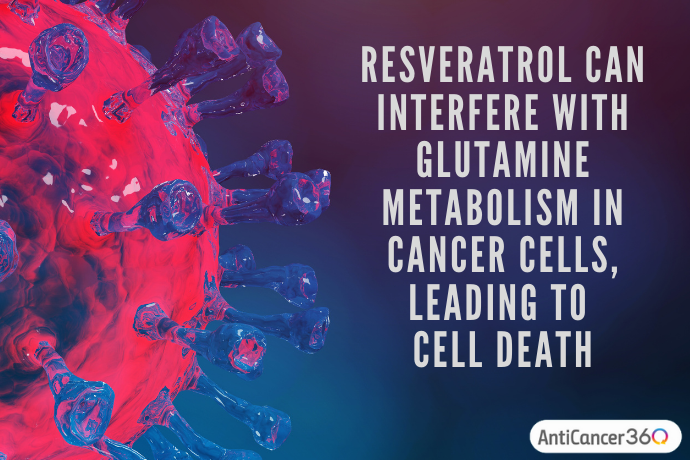
These researchers also observed that the resveratrol-treated tumor cells had fewer glutamine transporters than non-resveratrol-treated tumor cells. Resveratrol seemed to interrupt the construction of crucial glutamine transporters that cancer cells need to make energy. So, resveratrol decreases glutamine transporters, preventing glutaminolysis, which shuts down energy production and leads to cell death [7].
Resveratrol Reprograms Cancer Metabolism of Fats
Besides its ability to block cancer cells’ sugar and protein metabolism, resveratrol is also well-known for its effects on fats’ metabolism.
Fats (lipids, fatty acids, and cholesterol) are essential energy metabolism sources in the human body. The metabolism of fats affects many fundamental cellular processes, including cell growth, proliferation, and survival. Fat molecules are required for cancer cells to build their cell membranes and nutrient transporters. So, the strategic targeting of fatty acid metabolism plays a significant role in fighting cancer.
Some breast cancer cells are known for their overexpression of a transporter called human epidermal growth factor receptor 2 (HER2) on their cell surface. The increased number of HER2 seems to increase the production of FASN (fatty acid synthase), a vital enzyme for metabolizing fats.
Studies show that resveratrol reduces the growth of breast cancer by blocking FASN. These findings suggest that resveratrol, through its multi-pronged effects, interrupts the cancer cell cycle and ultimately leads to cell death via blocking FASN in HER2 positive breast cancer [8].
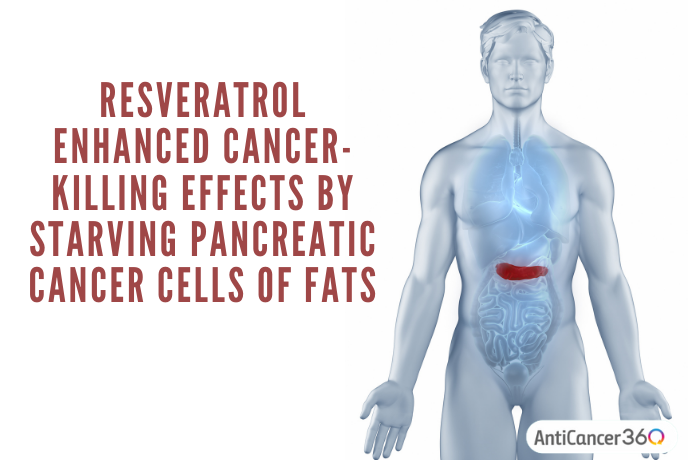
Resveratrol also influences the actions of proteins called SREBPs (sterol regulatory element-binding proteins). SREBPs function to construct essential enzymes for the uptake and building of fats, lipids, and cholesterol.
A laboratory study published in 2019 concluded that resveratrol enhanced the effects of gemcitabine, a chemotherapy drug, on pancreatic cancer cells. The researcher determined that resveratrol made the cancer cells more sensitive to gemcitabine by interfering with the cells’ SREBPs, ultimately starving the cancer cells of fats [9].
Aggressive Integrative Approach with Resveratrol
In addition to suppressing cancer cell metabolism, resveratrol may also have protective benefits on healthy cells. Studies have shown that resveratrol can help relieve some side effects of chemotherapy drugs.
Although doxorubicin is a highly effective chemotherapy drug, it has a significant risk of side effects, including damage to heart cells. In cell and rat studies, scientists have found that the combination treatment of doxorubicin with resveratrol decreases damage to heart cells [10].
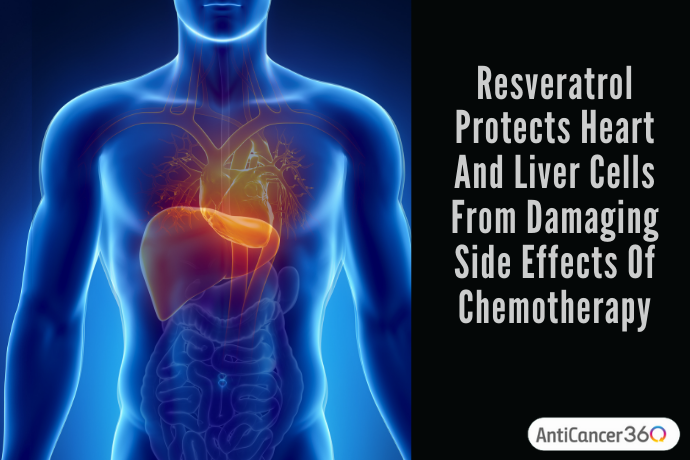
Another study of the combined effects of high-dose doxorubicin and resveratrol showed that resveratrol protects rats from heart and liver damage [11].
How To Use Resveratrol: Dosages, Side Effects, and Precautions
Dosage
Resveratrol oral supplements are available in a range of strengths, usually 100 mg to 500 mg once or twice daily [1]. Taking resveratrol with high-fat foods may decrease the amount of resveratrol that is absorbed by the body. For best results, do not take resveratrol with food.
Side Effects
Resveratrol is generally safe and non-toxic when taken as an oral supplement up to 1500 mg per day. Resveratrol may cause stomach problems when taken in higher doses of 2000 mg or more per day, such as stomach pain, loose stools, and diarrhea [1].
Precautions
Resveratrol might slow blood clotting and could increase the risk of bleeding in people with bleeding disorders. Resveratrol could also increase the risk of bleeding during and after surgery. Stop taking resveratrol at least two weeks before a scheduled surgery.
Resveratrol can have estrogen-like effects. If you have a hormone-sensitive condition that might be worsened by exposure to estrogen, do not take resveratrol without first discussing it with your healthcare provider [1].
Interactions with Drugs and Supplements
Many unknown potential interactions can happen with resveratrol, especially with chemotherapy and other supplements or medicines. This is not a comprehensive list of possible interactions.
- Medications or supplements that slow blood clotting (Anticoagulant or Antiplatelet drugs or herbs). Resveratrol might slow blood clotting, which could make the blood thinner. Taking it along with other blood-thinning medicines or herbs could increase the risk of bleeding or bruising. Some examples of blood-thinning drugs include aspirin, non-steroidal anti-inflammatory drugs (NSAIDs) like ibuprofen, or warfarin (Coumadin). Some examples of blood-thinning herbs include danshen, feverfew, ginkgo, and turmeric [1].
- Medications or supplements that are broken down by specific enzymes. Certain enzymes break down some substances in the liver and intestines. Resveratrol can block the action of some of these enzymes, which increases the body’s exposure to certain drugs or substances. This interaction may increase the effects and side effects of some medicines, including chemotherapy drugs such as etoposide and paclitaxel [1].
Before taking other medications or supplements, you must consult with your doctor or healthcare professional before including resveratrol in your program.
Will Resveratrol Strengthen Your Personal Battle with Cancer?
Ultimately, you can see that there can be many potential benefits of adding a natural dietary supplement like resveratrol to your overall anticancer program.
When using the “Aggressive Integrative Approach” to cancer, the goal is to fight cancer from every possible angle. This approach includes integrating natural supplements to fight cancer based on available evidence, despite limited human studies… and to do it in a way that won’t interfere with your oncology treatments.
So now here’s the question… why not fight cancer from every possible angle, especially with advanced or late-stage cancers?
How are you approaching your overall plan to fight cancer? Have you incorporated any natural supplements like resveratrol? Let us know in the comments below!
If you’re interested in using an Aggressive Integrative Approach for your case… you can learn more about our program by watching one of our free online webinars.
Please discuss the risk-versus-benefit potential with your healthcare professional before starting any natural supplement, including resveratrol.
Are You A Candidate For Our Program?
If you’d like to learn more about the AntiCancer360 approach and see if we can help you… please watch our free online webinar to learn more about our approach. Then at the end, you’ll be able to schedule a free call with someone from our team so that we can discuss your case in more detail.
Citations
Dr. Patricia Weiser is one of AntiCancer360’s consultant pharmacists, science advisors, and medical writers. Her expertise helps us create safe herbal and supplement combinations and avoid potential drug interactions. Patricia is a graduate of the University of Pittsburgh and a licensed pharmacist. She has clinical experience in both community and hospital pharmacy. She is passionate about integrative and preventative care and strives to empower her patients to take an active role in their health. Co Authors :

